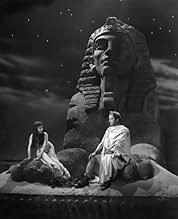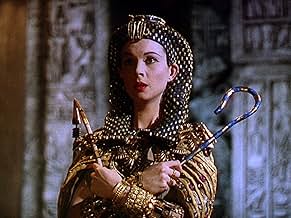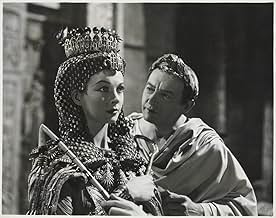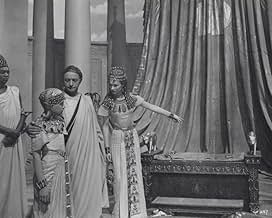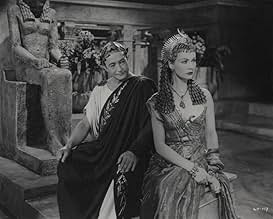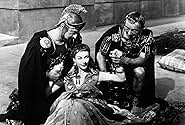IMDb RATING
6.2/10
3.4K
YOUR RATING
At the height of the Roman Civil War, a young Cleopatra (Vivien Leigh) meets a middle-aged Julius Caesar (Claude Rains), who teaches her how to rule Egypt.At the height of the Roman Civil War, a young Cleopatra (Vivien Leigh) meets a middle-aged Julius Caesar (Claude Rains), who teaches her how to rule Egypt.At the height of the Roman Civil War, a young Cleopatra (Vivien Leigh) meets a middle-aged Julius Caesar (Claude Rains), who teaches her how to rule Egypt.
- Nominated for 1 Oscar
- 2 nominations total
Anthony Eustrel
- Achillas
- (as Antony Eustrel)
James McKechnie
- 2nd. Centurion
- (as James Mc Kechnie)
Featured reviews
Shaw was a wonderful historian with a deadly eye for irony. Claude Rains brings off Caesar with withering poise and breezy wit, standing tall above the flashing eye of an Egyptian hurricane named Cleopatra (Vivien Leigh). Caesar's aide-de-camp is an affable bear of a man named Rufio (Basil Sydney), who mainly just keeps his eye on Caesar. Cleopatra is likewise sheltered by her scheming counselor Ftatateeta (Flora Robson), a name that not even Caesar can pronounce. Character actor Cecil Parker as Britannus adds quaintness and serendipity to an already splendid alchemy of spotty characters. The film moves by turns through a narrow skein of classical history as the reliquarian Egyptian world gives way to a streamlined Roman one. Along the way, we witness the contending parties encompassed and entangled in a delightful pantheon of wit, irony, satire, morals, manners, and adventure. Overall, a tremendously facile projection of one of England's sharpest satirical voices, G.B. Shaw.
Shaw's hardly a speck on the windshield of American cultural consciousness anymore. Too bad. "The Devil's Disciple," "Major Barbara," "Arms and the Man," "Candida," "You Never Can Tell." Witty, clever, insightful, intriguing... a century and more later.
For those who haven't discovered him yet, this colorful, fast-paced rendition of "C&C" makes a nifty portal. The film -looks- like "Quo Vadis" or "Samson and Delilah" (of more or less the same vintage). It even looks like the Taylor-Burton-Harrison marathon done almost two decades later.
But it doesn't -feel- like -any- of those. Shaw always had a great story to tell -- and a something worthwhile to -say- -- and he (or his characters) almost invariably told and said it well. One could hardly call the 1934 or 1963 films "insightful romps." This, however...
I've been a sucker for Vivien Leigh since I watched her whip the boys into shape in "GWTW," but as interesting as she was there, she's miles beyond Scarlet O'Hara here. Shaw gave -his- Cleo a far more complex character than Young or Mankiewicz gave their Cleo's; this alabaster Leigh is both adolescent and guileful. But to Rains's conflicted but self-suspect Caesar, she's about as transparent as that look-alike, late-night, hottie-cum-biblical-scholar who inherited Gene Scott's TV ministry.
The relationships here are no different from those in the Mankiewicz mess, but they move along in far more sophisticated -- and entertaining -- fashion here. We already know the resolution, it's the unfolding of the drama that matters.
Rains ("Casablanca," "The Invisible Man") and Leigh bring the wise, amused, self-effacing old man and the desperate, manipulative, narcissistic young woman in Shaw's play far more credibly to life than was the case in the DeMille or Manciewicz films. And supporters like Robson, Granger and the rest add plenty. But as in any Shaw play, it's the playwright's sophisticated revelations that matter.
The "big success" narcissist who thinks a "trophy wife" is a good idea might learn plenty from a trip to Blockbuster and a two-dollar investment.
For those who haven't discovered him yet, this colorful, fast-paced rendition of "C&C" makes a nifty portal. The film -looks- like "Quo Vadis" or "Samson and Delilah" (of more or less the same vintage). It even looks like the Taylor-Burton-Harrison marathon done almost two decades later.
But it doesn't -feel- like -any- of those. Shaw always had a great story to tell -- and a something worthwhile to -say- -- and he (or his characters) almost invariably told and said it well. One could hardly call the 1934 or 1963 films "insightful romps." This, however...
I've been a sucker for Vivien Leigh since I watched her whip the boys into shape in "GWTW," but as interesting as she was there, she's miles beyond Scarlet O'Hara here. Shaw gave -his- Cleo a far more complex character than Young or Mankiewicz gave their Cleo's; this alabaster Leigh is both adolescent and guileful. But to Rains's conflicted but self-suspect Caesar, she's about as transparent as that look-alike, late-night, hottie-cum-biblical-scholar who inherited Gene Scott's TV ministry.
The relationships here are no different from those in the Mankiewicz mess, but they move along in far more sophisticated -- and entertaining -- fashion here. We already know the resolution, it's the unfolding of the drama that matters.
Rains ("Casablanca," "The Invisible Man") and Leigh bring the wise, amused, self-effacing old man and the desperate, manipulative, narcissistic young woman in Shaw's play far more credibly to life than was the case in the DeMille or Manciewicz films. And supporters like Robson, Granger and the rest add plenty. But as in any Shaw play, it's the playwright's sophisticated revelations that matter.
The "big success" narcissist who thinks a "trophy wife" is a good idea might learn plenty from a trip to Blockbuster and a two-dollar investment.
Bernard Shaw does not perhaps adapt too well to the screen, but, in my opinion, this adaptation is particularly successful and probably the best of them all, although one video edition in the UK didn't even risk mentioning Shaw's name anywhere on the box, prefering to market it as mere exotic spectacle. It is of course all that, but as with everything Shaw wrote, much, much more, and is essentially about IDEAS, (not necessarily, as has often been contended, always Shaw's own personal convictions). Vivien Leigh as Cleopatra gives yet another sublime and first-rate performance as she progresses from frightened teenager to an imperious Queen with a real understanding of power. (The scene in which she whips a hapless slave in order to experience the "thrill" of total power, strangely pre-echoes the psychology of the much misunderstood SALO). Mention too must also be made of the superb musical score by Georges Auric, and admiration expressed for the sheer audacity of producer Pascal for making such a lavish and expensive production in poverty-stricken post-war Britain. Well worth watching.
Cleopatra and Julius Caesar carry on an arch flirtation, while spouting epigrams courtesy of George Bernard Shaw, in this literate, exuberant and thoroughly enjoyable movie. "Caesar and Cleopatra" stands out against the typical British production, which tends to be drab and morose. (Other notable exceptions are the works of Pressberger & Powell, the Korda brothers and Olivier.)
Claude Rains is perfectly cast as the cynical, world-weary and "ready for the knife" Julius Caesar. I'm not sure if it's makeup, or perhaps lighting, but Rains's face looks like it was taken from one of those memorial portraits in the Roman catacombs. In any case, while it may be Caesar's countenance we see, it's Shaw's voice we hear. I love Claude Rains in everything, but there's an intimacy with Rains here that makes "Caesar and Cleopatra" one of my Rains favorites.
And Vivian Leigh. What can I say? Her Cleopatra is Scarlett O'Hara, except that while Scarlett's flirtations were matters of the heart, Cleopatra's were purely matters of state. In the beginning Cleopatra is a sheltered, naive...well, princess. By the end, she has learned well at Caesar's knee and possesses the ruthlessness and guile of statecraft - she is a queen.
Another delight is Stewart Granger's swashbuckling Apollodorus, and Flora Robson has a delicious part as Cleopatra's nursemaid Ftatateeta. Robson is well qualified as a tutor of royalty, having herself played Queen Elizabeth in "Fire over England".
Like another classic British spectacle, "The Four Feathers," "Caesar and Cleopatra" is one of the treasures in my film archive which I view repeatedly alone.
Claude Rains is perfectly cast as the cynical, world-weary and "ready for the knife" Julius Caesar. I'm not sure if it's makeup, or perhaps lighting, but Rains's face looks like it was taken from one of those memorial portraits in the Roman catacombs. In any case, while it may be Caesar's countenance we see, it's Shaw's voice we hear. I love Claude Rains in everything, but there's an intimacy with Rains here that makes "Caesar and Cleopatra" one of my Rains favorites.
And Vivian Leigh. What can I say? Her Cleopatra is Scarlett O'Hara, except that while Scarlett's flirtations were matters of the heart, Cleopatra's were purely matters of state. In the beginning Cleopatra is a sheltered, naive...well, princess. By the end, she has learned well at Caesar's knee and possesses the ruthlessness and guile of statecraft - she is a queen.
Another delight is Stewart Granger's swashbuckling Apollodorus, and Flora Robson has a delicious part as Cleopatra's nursemaid Ftatateeta. Robson is well qualified as a tutor of royalty, having herself played Queen Elizabeth in "Fire over England".
Like another classic British spectacle, "The Four Feathers," "Caesar and Cleopatra" is one of the treasures in my film archive which I view repeatedly alone.
The film overall is slow and laborous but Vivien's performance as Cleopatra is sublime. I wish she was the only cast member! Her range is incredible from a young, playful kitten of a queen to a dignified ruler of Egypt.
Seeing Vivien in full Cleopatra garb is breath-taking! She raises beauty to a different level.
Seeing Vivien in full Cleopatra garb is breath-taking! She raises beauty to a different level.
Did you know
- TriviaClaude Rains made history by being the first actor to receive a salary of US$1,000,000 for his portrayal of Julius Caesar.
- GoofsCaesar refers to his nose as "rather long" and "a Roman nose," but the idea of a "Roman nose" was not introduced until almost 150 years later, when the Emperor Hadrian erected statues of his favorite, Antinous, throughout the Empire (where many of the people had never seen a Roman), and Antinous's long nose was taken as typical of Romans (even though Antinous was a Greek).
- Quotes
Julius Caesar: And so to the end of history, murder shall breed murder, always in the name of right, and justice, and peace, until the gods create a race of men that can understand.
- Crazy creditsClosing credits cast list finishes with And The Crowd.
- ConnectionsFeatured in Great Performances: Laurence Olivier: A Life (1983)
- How long is Caesar and Cleopatra?Powered by Alexa
Details
Box office
- Budget
- £1,278,000 (estimated)
- Runtime
- 2h 3m(123 min)
- Aspect ratio
- 1.37 : 1
Contribute to this page
Suggest an edit or add missing content


